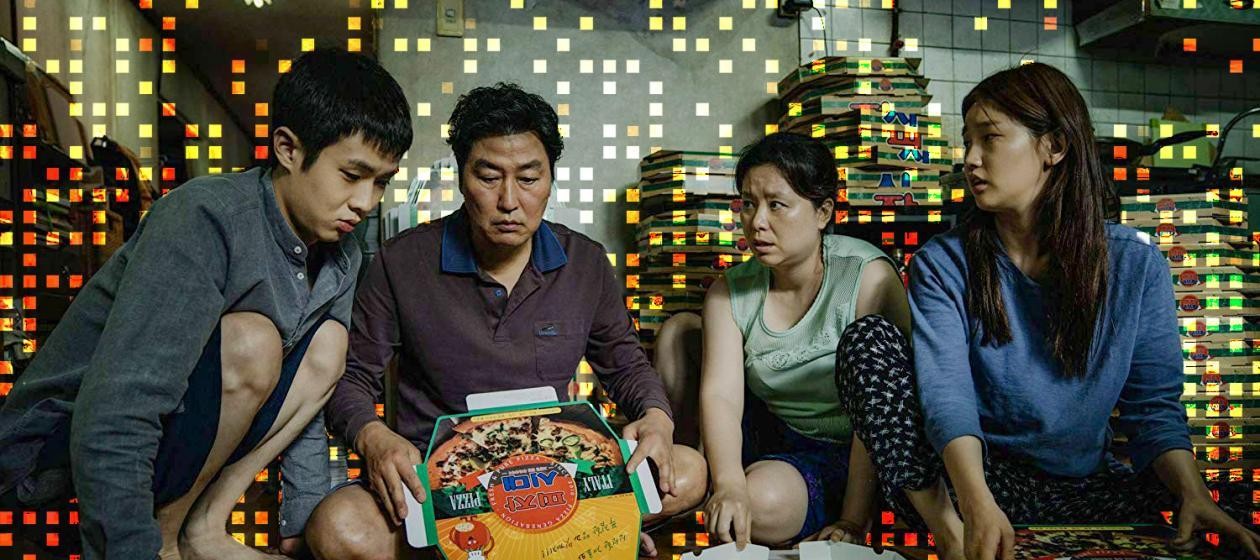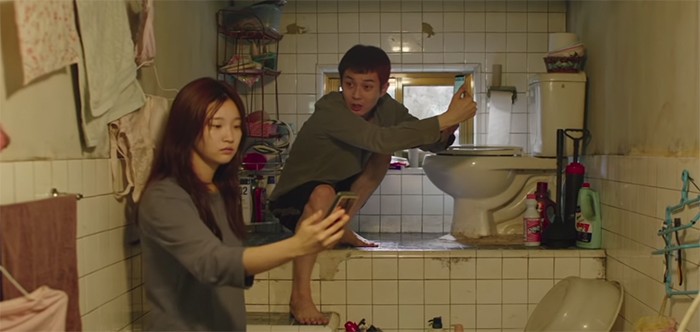
Choi Woo-shik, Song Kang-ho, Jang Hye-jin, and Park So-dam as a family of grifters in Parasite.
Bong Joon-ho’s Parasite premiered in Memphis while I was neck deep in watching films for the Indie Memphis Film Festival, so I’m just now getting around to seeing it. All I have to say is, Ho-ly crap.
Actually, that’s not all I have to say. I’ll have to watch it again to be sure, but I think Parasite may be a perfect film. There’s not a shot out of place or that is redundant, not a false character moment, not a bad or even mediocre performance, and not a wasted line. It’s a riveting — often jarring — watch from beginning to end, and it couldn’t be more relevant to the moment we live in.
Earlier this year, the director, who is probably best known in America for Snowpiercer, became the first Korean to win the Palme d’Or at Cannes. He expressed surprise that the film, which he thought was about a very specific dynamic in Korean culture, had been so universally well-received. But the story it tells, as outlandish as it is, is instantly relatable to anyone living in a capitalist society.
The protagonists of the story are the Kim family, who live a marginal existence scraping by in a Seoul semi-basement apartment. Their introduction, when they learn that their upstairs neighbor has discovered that they have been leeching off his wifi and password protected it, is a textbook of efficient and effective characterization. When son Ki-woo’s (Choi Woo-shik) well-meaning friend Min-hyuk (Park Seo-joon) gifts the family a “scholar’s rock,” a Korean keepsake said to bring wealth to the household, their fortunes seem to turn around. First, Ki-woo gets an opportunity to become an English tutor to the cute teenage daughter of the wealthy Park family, Da-hye (Jung Ji-so). But first, he has to get his sister Ki-Jeong (Park So-dam, first among equals in this amazing cast) to forge his college credentials. The pair of siblings camping out in a crowded Seoul cyber-cafe, while Ki-Jeong “earns her degree in document forging,” is one of those perfectly constructed, fleeting shots that stuck with me long after the film was over.

Searching for free wi-fi in the Kim family bathroom.
Once Ki-woo is ensconced in the wealthy Park household, he sets about setting up his family by driving off their hired help, and replacing them with Kims. First is Ki-Jeong, who effortlessly scams the young, anxiety-ridden mother Yeong-gyo (Choi Yeong-gyo, using her real name for the part) into believing she’s an art therapist for their disturbed young son Da-song (Jung Hyun-joon). Then father Ki-taek (Song Kang-ho) muscles his way in as a driver. Finally, mother Chung-sook (Jang Hye-jin) displaces the elderly housekeeper Moon-gwang (Lee Jung-eun). The money is rolling in for the Kims, and they have all the food and booze they can steal from the Parks’ overflowing larders. But Moon-gwang has a secret that goes beyond any scam the Kims are pulling, and deception after deception starts piling up as the two lower-class families are pitted against each other in an effort to keep getting paid for menial tasks.
I feel like I’ve already given away too much of the plot of Parasite, but the film’s second half goes completely off the rails in constantly surprising ways. The most striking thing about Bong Joon-ho’s vision of class is that wealth completely fails to bring pleasure to the wealthy, and poverty is all about avoiding pain for the Kims. Parasite is at once a comedy and a Hitchcockian thriller with shades of mid-period Cohen Bros thrown in for good ironic measure. This film is a solid must-see for anyone who values quality filmmaking with something to say.
Parasite